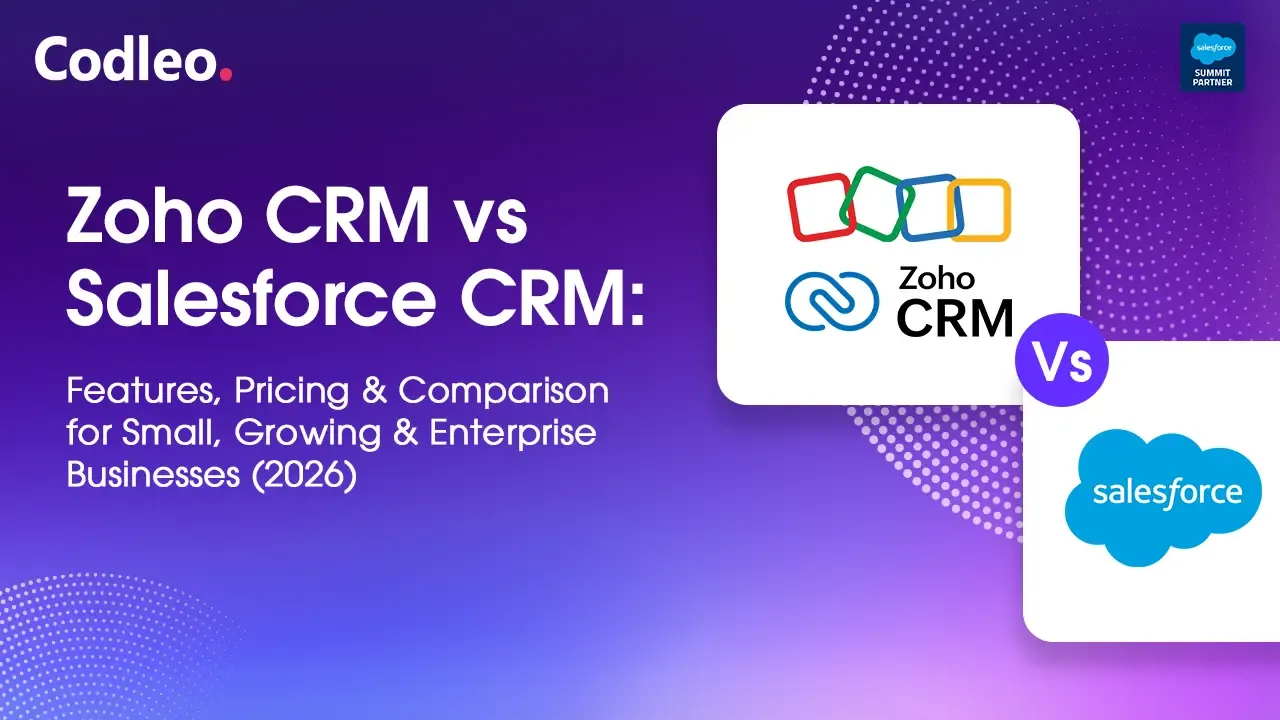Publish date:
The Importance of CRM Automation for Sales-Driven Organizations
Customer Relationship Management (CRM) platforms have become essential for sales-focused organizations aiming to manage their interactions with customers and prospects effectively. Relying on spreadsheets and manual recordkeeping has its limits, and implementing a CRM system signals a commitment to growth, streamlined workflows, and an optimized sales process.
When used effectively, a CRM can boost lead conversion rates by an impressive 300% and increase the average purchase value by 40%.
As customer interactions become more complex, maintaining efficient and organized systems is crucial. The answer lies in CRM automation.
In this guide to CRM automation, you’ll discover how to enhance efficiency, save time, and elevate your sales team’s performance by automating various functions of your CRM software. We’ll delve into the significant benefits of CRM automation and explore how modern CRM solutions leverage new technologies to deliver greater value to B2B organizations. Additionally, we’ll examine five of the top CRM automation solutions available today.
What is CRM Automation?
Customer Relationship Management (CRM) automation refers to the process of automating various marketing, sales, and customer service tasks to assist teams in tracking their interactions with both current and potential customers. By automating your CRM, you can eliminate the tedious and repetitive manual data entry that often consumes valuable time. This boosts productivity and allows team members to focus on higher-value activities such as lead generation, relationship building, nurturing leads, and converting deals.
Several cloud-based CRM automation platforms are available, including Salesforce, HubSpot, Zoho, and FreshSales.
Additionally, there are newer CRM platforms that focus on relationship intelligence, which are particularly beneficial for teams that depend on relationships to source, influence, and close deals. Exploring how these relationship intelligence platforms compare to traditional CRM solutions can provide valuable insights into enhancing your CRM strategy.
The Primary Functions of CRM Automation
CRM automation tools offer a range of functionalities that can significantly enhance your organization's efficiency. Here are some essential features to look for when considering an automated CRM system:
-
Contact Management: An automated CRM system organizes and manages essential contact information, including names, phone numbers, email addresses, social media profiles, and company details, ensuring your team has easy access to accurate customer data.
-
Lead Management: With CRM automation, your team can effectively track sales pipelines and manage all activities related to leads. This includes identifying leads, tracking their progress, scoring them based on engagement, and managing workflows from start to finish. Salespeople can always access the most current data, enabling them to engage effectively with leads and prospects.
-
Email Marketing and Marketing Automation: CRM software enhances your marketing efforts by allowing teams to create welcome messages, email campaigns, and follow-up communications. Automated CRM systems enable list segmentation for personalized messaging, track email engagement, monitor changing customer preferences, and assist in planning new marketing drip campaigns.
-
Integration with Other Applications: Intelligent CRM platforms seamlessly integrate with various applications and tools, such as calendars, email systems, help desk platforms, and project management tools. These integrations promote collaboration across the organization and ensure that interaction histories remain up-to-date and accessible, eliminating the need to search for the last person who spoke with a client.
-
Analytics and Reporting: Automated CRM systems come equipped with customizable reporting features that facilitate data-driven decision-making. You can streamline reporting on key performance indicators (KPIs) and metrics, ensuring you always have access to high-quality, up-to-date data to optimize sales and marketing efforts.
The Benefits of CRM Automation
Implementing CRM automation can significantly enhance various aspects of your business. Here are some key benefits your company can experience:
-
Streamlined Tasks: Automating repetitive tasks allows your team to accomplish more in less time, leading to increased productivity across the board.
-
Lead Generation and Qualification: CRM automation helps in generating more leads and improving qualification rates, ensuring your sales team focuses on the most promising prospects.
-
Higher Sales Conversions: By concentrating on your best leads, you can increase sales conversions, maximizing your return on investment.
-
Enhanced Customer Experience: Automation enables quicker response times to customer inquiries and issues, resulting in improved customer satisfaction and loyalty.
-
Simultaneous Marketing Campaigns: With marketing automation software, you can execute multiple campaigns at once, reaching your audience effectively and efficiently.
-
Increased Profits: Higher customer retention rates driven by effective CRM automation lead to improved profitability for your organization.
-
Empowered Teams: By freeing up service agents and sales representatives from routine tasks, they can dedicate more time to building relationships and addressing complex issues.
Best Practices for CRM Automation Solutions
Implementing CRM automation is designed to simplify the workflow for your sales and marketing teams. To ensure you get the most out of your investment and achieve high ROI, it's crucial to promote optimal adoption and maintain clean data. Here are some best practices to facilitate a smooth implementation of your automated CRM:
Choose a User-Friendly Platform
Selecting the right tools is the foundation of successful CRM automation. Look for a platform with a clear, intuitive user interface that quickly responds to search queries and offers complete customer data.
Select an Easy-to-Use Yet Robust CRM
To enhance the efficiency of your sales teams, choose a platform that aligns closely with your existing workflows. Since various teams will utilize the CRM for different purposes, ease of use is critical for higher adoption rates. Centralizing data in one platform also improves integration and utilization.
Ensure Mobile Accessibility
In today’s globalized environment, it’s essential for data to be accessible 24/7 on all devices. Opt for a cloud-based, mobile-friendly CRM that offers real-time data management and includes a mobile app for on-the-go access.
Track Multi-Channel Data
Many interactions occur before a prospect becomes a lead, and capturing this activity in your CRM is vital for analysis and action. Ensure your CRM integrates with marketing analytics tools to track landing page visits, form submissions, email open rates, and click-through rates. Additionally, linking social media tools can help your sales team gain insights into client behavior and respond swiftly to inquiries or complaints.
Establish a Standard CRM Automation Process
Allowing various formats for data entry can compromise data integrity. Maintain consistency by creating clear guidelines for manual data entry, updates, and imports. Where possible, use drop-down menus instead of free-text fields to minimize errors. Educate your team on the importance of data quality to avoid missing opportunities due to outdated information.
Customize Automation Features
Tailor your CRM platform to fit your specific sales processes. Set up automatic welcome campaigns for new customers and create follow-up reminders to engage with top prospects and valuable referral sources consistently.
Provide Comprehensive Training
While advanced automation systems typically see better user adoption than traditional CRMs, your sales and marketing teams will still need guidance on maximizing their use of customer and prospect data. Offer training sessions, workshops, and one-on-one practice opportunities with your vendor’s support team to empower your staff.
The 3 CRM Functions Every Sales and Deal Team Should Automate
While marketing automation platforms get much attention, sales and deal teams have their unique automation needs. Here are three essential CRM functions that should be automated to enhance efficiency and drive revenue:
Manual Data Entry
Research shows that over 40% of workers dedicate at least a quarter of their workweek to manual, repetitive tasks like data entry. Additionally, 90% of employees report feeling burdened by these tasks, which can easily be automated.
A robust CRM should take on these repetitive tasks, allowing your sales team to focus on what truly matters: finding new leads and closing revenue-generating deals. The right CRM or integrations can save your team hundreds of hours. For instance, with an efficient solution, each user could save up to 200 hours of manual work annually.
Relationship Insights
Relationships are vital for closing deals. Understanding and navigating the connections between customers and your organization can be challenging, especially in larger setups. An effective CRM automatically generates and updates relationship insights, enabling your team to explore the sales landscape with confidence.
By automating the generation of relationship insights, you can streamline the deal process. This capability allows your salespeople to uncover warm introductions and relationship paths, equipping them with the right information for every meeting and helping to accelerate deal closures.
Data Enrichment
Data enrichment enhances the quality of your existing customer data. A CRM that provides enriched data consolidates relationship insights, contact details, customer engagement data, and deal intelligence into a comprehensive dataset that sales teams can leverage to drive deals forward.
However, manually sifting through CRM data is a monumental task without a system that automates data enrichment. By automating this process, you not only save valuable time but also ensure your team is working with the most accurate and up-to-date customer information.
What Makes a Great Customer Relationship Management Automation Tool?
At its core, CRM software is designed to track customer interactions, manage deals, and monitor relationship activities. CRM automation software elevates this functionality by automating many tasks within the CRM, helping teams become more efficient and productive.
While each CRM tool offers unique features to meet diverse organizational needs, certain key elements stand out when evaluating which CRM automation tool is best for your team:
Customer and Sales Management
The primary function of a CRM is to track customer information, interactions, and deals through a visual sales pipeline. A great CRM should provide a clear overview of where each customer stands in the sales process, allowing teams to prioritize effectively and strategize their engagement.
Ease of Use
CRMs often handle complex tasks, so usability is paramount. Choose a tool that is intuitive and user-friendly, ensuring all team members can navigate it with ease. A user-friendly interface minimizes training time and boosts adoption rates across your organization.
Robust Reporting
High-quality reporting capabilities are crucial. If you can’t analyze your data effectively, improving processes and driving growth becomes challenging. Look for a CRM that offers customizable reports and dashboards to track key metrics, enabling data-driven decision-making.
Customization
Every organization has unique business models and requirements. A great CRM should be adaptable, allowing you to tailor features and workflows to align with your specific needs, rather than forcing you to conform to a one-size-fits-all solution.
Automation and Integrations
Automation is essential for enhancing productivity. A CRM that enables you to automate workflows—whether through built-in features or third-party integrations—can significantly reduce the time spent on repetitive tasks. This capability not only saves time but also helps allocate resources more effectively.
By considering these key features, organizations can identify the CRM automation tool that best suits their needs, ensuring a robust framework for managing customer relationships and driving growth.
CRM automation software to help you get the most from your data
Salesforce CRM
Overview
Salesforce CRM is a robust platform widely adopted by organizations across various industries for their sales automation needs. Its extensive capabilities make it particularly suitable for larger organizations or those requiring highly customizable solutions.
Customization and Integration
With over twenty years in the market, Salesforce boasts thousands of integrations and applications that allow users to tailor the platform to their specific needs. One of Salesforce's strongest features is its high level of customization; while many CRMs limit the ability to modify sales pipelines, Salesforce provides extensive flexibility. If the platform doesn't have the exact tool or feature you need, there is likely an out-of-the-box solution available on the Salesforce AppExchange.
Support and Accessibility
Salesforce offers 24/7 customer support through both telephone and live chat, ensuring users have access to assistance whenever they need it.
Pros
-
Comprehensive Management: Efficiently manage contacts, leads, and opportunities.
-
Lead Scoring: Available with the Unlimited Plan, enhancing lead prioritization.
-
Extensive Customization: Tailor the platform to fit unique business processes and requirements.
-
Powerful Reporting Functionality: Generate in-depth reports for better insights and decision-making.
Cons
-
No Free Plan: Unlike some competitors, Salesforce does not offer a free tier.
-
Setup Time: Initial configuration and customization can be time-consuming.
Pricing
Pricing for Salesforce starts at $165 USD per user per month, with each plan including a free 30-day trial, allowing organizations to evaluate the platform before committing.
Salesforce CRM stands out as a powerful solution for businesses looking to enhance their sales automation capabilities while benefiting from robust customization options and dedicated support.
HubSpot CRM
Overview
HubSpot CRM is a versatile platform that supports various teams, including sales, marketing, customer support, content management, operations, and e-commerce. Its comprehensive features enable seamless integration of multiple business functions.
Automation and Workflows
With HubSpot, you can automate actions based on how your contacts interact with your emails, as well as create workflows for automating sales actions like lead scoring and assignment. This automation helps streamline processes and improves efficiency across teams.
Marketing Integration
For organizations seeking a solution that combines a robust marketing hub with a CRM, HubSpot Marketing is an excellent choice. It allows you to manage everything from posting to your company blog to executing email marketing campaigns and monitoring your sales pipeline.
Pros
-
Free Plan Available: Access to essential features without any cost.
-
Scalable Contact Storage: Store up to one million contacts.
-
Extensive Deal Filters: Easily manage and categorize deals.
-
Customizable Solutions: Mix and match various HubSpot products to tailor a solution for your organization.
Cons
-
Limited Automation in Free Plan: Sales workflow automation is not included in the free version.
-
Best for Small Businesses: The suite is more suited for small to mid-sized organizations rather than large enterprises.
Pricing
Pricing starts at $85 USD per user per month, providing a cost-effective option for businesses looking to enhance their sales and marketing capabilities.
Zoho CRM
Overview
Zoho CRM is a comprehensive tool that integrates various applications such as Campaigns for email marketing, Desk for customer service, and Bookings for appointment scheduling. It enables users to manage leads and deals in their sales pipeline while generating insightful sales reports.
AI Integration
Zoho's proprietary AI, Zia, operates in the background to manage contacts, identify potential customers, and suggest relevant products and services. This intelligent feature enhances decision-making and boosts sales effectiveness.
Pros
-
Lead Scoring Automation: Set up lead scoring rules that are automatically assigned in the future.
-
Ecosystem Integration: Create a cohesive environment using other Zoho applications.
-
Extensive Customization: Create up to 2,500 rules within your CRM for tailored automation.
-
Free Account Available: Access essential features without any cost.
Cons
-
Complex Learning Curve: The sales funnel software can be complicated and may take time to master.
-
Limited Advanced Features: Most advanced capabilities are restricted to higher-priced tiers.
Pricing
Pricing starts at $20 USD per user per month, making Zoho CRM an affordable option for businesses looking to enhance their customer relationship management.
Run a Better Business with CRM Automation at Codleo Consulting
At Codleo Consulting, a leading Salesforce partner, we understand the importance of efficient CRM automation for your business. By implementing advanced automation features in your CRM platform, you can streamline your processes and enhance productivity.
Maximize Efficiency with Automation
Our CRM solutions eliminate the need for time-consuming manual data entry, freeing up valuable hours for your team. This allows your sales and deal teams to focus on high-value activities, ultimately driving revenue growth.
Harness Relationship Intelligence
With Codleo's CRM automation, you gain access to vital relationship insights that help you navigate your organization’s networks effectively. As experienced CRM consultants, we ensure you always have a complete history of your connections, enabling you to identify the best paths for introductions and collaboration.
Create Opportunities and Close Deals
By leveraging our CRM automation, you can connect with key contacts, uncover new opportunities, and close deals more efficiently. Our tailored solutions empower your team to work smarter, not harder, positioning you for success in a competitive landscape.
Discover the Codleo Advantage
Reach out to us today to learn how Codleo Consulting can help you harness the power of CRM automation and maximize your Salesforce investment to enhance your business operations and drive success.















